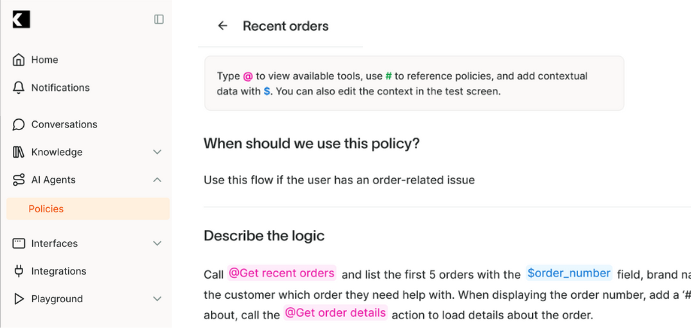Ingredients
The systems used by this policy include Narvar, Gladly, and Kodif.
What are AI Policies?

At Kodif, we’re excited to announce the launch of Policies—a powerful, dynamic solution designed to revolutionize the way CX managers handle customer support. Unlike traditional flows, which are rigid and complex, Policies empower non-technical users to create and manage customer interactions with ease. Written in natural language, Policies make it simple to define and refine customer experiences without needing to rely on complicated flowcharts or scripting. This approach is not only user-friendly but also self-serve, enabling CX teams to quickly translate existing Standard Operating Procedures (SOPs) into automation, saving valuable time and resources.
The flexibility of Kodif Policies ensures that businesses can offer personalized, context-driven support while continuously improving customer experiences. With Policies, you can experiment with different strategies to optimize outcomes such as CSAT, revenue, and retention—all without the need to rebuild complex workflows. Whether it’s automating routine interactions or testing new approaches for high-stakes scenarios, Policies provide a scalable, adaptable solution that aligns with your business goals. While flows still have their place in sensitive, high-risk situations, Policies offer an agile alternative that helps businesses innovate faster and deliver exceptional, tailored experiences at scale.
“WISMO” Ticket Type Explained
“WISMO” stands for “Where Is My Order?” and is a commonly used term in customer support for inquiries related to order status and tracking. These types of tickets are crucial for maintaining customer satisfaction as they address a fundamental aspect of the customer experience—knowing when and where their purchased items will arrive. Efficient handling of WISMO tickets is essential for reducing customer anxiety and ensuring a smooth post-purchase experience. Businesses often rely on advanced tracking systems and proactive communication strategies to manage these inquiries effectively.
Which Platforms Does This AI Policy Work On?
This AI policy is designed to work seamlessly with Narvar, Gladly, and Kodif. Notably, Kodif offers integration capabilities with all other major platforms, ensuring that businesses can leverage these policies across various systems for enhanced customer support.
When Should I Use This Policy?
This policy is best used when customers are inquiring about the status of their orders. By implementing this policy, businesses can efficiently manage WISMO tickets, providing timely and accurate information to customers. The logic for this policy involves using natural language commands to access and manage order details.
Here’s a brief overview of the logic:
-
Ask for the user’s email address
a. Use@get_narvar_account_detailsto verify the user’s email in Narvar.
b. If not found, prompt for a valid email.
c. If still not found, escalate to an agent. -
Display Recent Orders:
a. Use@get_narvar_ordersto fetch recent orders.
b. Present the list and ask which order they want to know about.
c. If orders are not found, escalate to an agent. -
Check Order Status
a. Retrieve status using@narvar_order_details(order_id: str).
b. Inform the customer based on the order status: “Approved”, “Processing”, “Pending Shipment”, “Shipped”, “In transit”, “Delivered”, or “Canceled”.
c. In case of “In transit” delays, escalate the issue.
Policy Logic
This policy should be employed whenever customers inquire about their order status. The logic is straightforward and leverages the power of AI to automate responses:
-
Ask for the user’s email address
a. Use@get_gladly_account_detailsto check the user’s email in Gladly.
b. If not found, request a valid email.
c. If the email is still not found, escalate to an agent. -
Display Recent Orders:
a. Use@get_gladly_ordersto retrieve recent orders.
b. Display the list and inquire which order they are interested in.
c. If not found, escalate to an agent. -
Check Order Status
a. For the selected order, use@gladly_order_details(order_id: str)to get the status.
b. Inform the customer based on the status: “Approved”, “Processing”, “Pending Shipment”, “Shipped”, “In transit”, “Delivered”, or “Canceled”.
c. Handle any “In transit” delays by escalating the query.
Example Policy
To demonstrate the use of this policy, consider the following example:
-
Ask for the user’s email address
a. Use@get_narvar_account_details(email: str)to verify the email.
b. If not found, request a valid email.
c. If still not found, escalate to an agent. -
Display Recent Orders:
a. Use@get_narvar_orders(email: str)to fetch orders.
b. Present the list and ask the customer to select an order.
c. If orders are not found, escalate to an agent. -
Check Order Status
a. For the chosen order, use@narvar_order_details(order_id: str)to check the status.
b. Provide information based on the status: Approved, Processing, Pending Shipment, Shipped, In Transit, Delivered, or Canceled.
c. For “In transit” delays, escalate to an agent.
This approach ensures a seamless customer experience by automating routine inquiries and allowing agents to focus on more complex issues.


